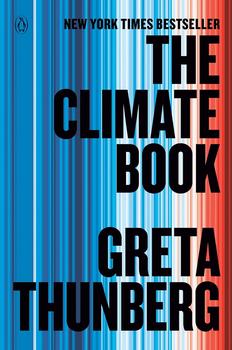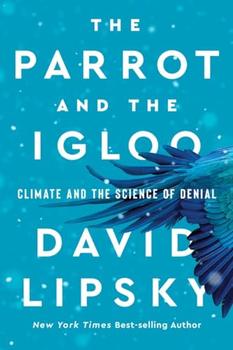Summary | Excerpt | Reviews | Beyond the book | Read-Alikes | Genres & Themes | Author Bio

The Facts and the Solutions
by Greta Thunberg"How can we undo our failures if we are unable to admit that we have failed?" This question lies at the crux of The Climate Book by Greta Thunberg. It's the most difficult of the many tough questions posed by this book, yet it also offers the possibility of a path forward, suggesting that with enough strength to make different choices, we can prevent the worst of our shared climate catastrophe. It's this brutally honest yet cautiously constructive approach that makes The Climate Book vital reading, particularly for those living in the Global North.
Thunberg punctuates the book with her own essays—on climate science, what she's heard from political leaders, lessons from her activism—but the majority of the text consists of contributions from experts across a wide spectrum of fields. Thus, leaders in geology, atmospheric science, oceanography, and all types of plant and animal life lay out, in devastatingly clear detail, what humans have done to natural systems, and how those systems have changed and will continue to change as a result.
Ambitious and comprehensive in scope, this book starts at the beginning: Earth's carbon cycle and how human activity has caused it to spin out of control. From there, the narrative moves to what this means for humanity, now and in the future. Social scientists, journalists and leaders of NGOs explain how and why food production must change, the risk of diseases and violent conflicts, and the reality that huge swathes of the planet will soon be unlivable, and what that portends for human migration and climate refugees.
Its short chapters and its structure—focused on what we know, what we're doing or not doing, and what we must do—make this book an easy and challenging read at the same time. Complex subjects are explained quickly and clearly, before the reader can get bogged down in jargon. But the sheer breadth of the climate catastrophe and its multifaceted impact on every sphere of life might leave the reader feeling overwhelmed.
Yet this is Thunberg's point: the enormity of the climate crisis must be faced, no matter how terrifying it may be, if we are to have any hope of mitigating it.
And the book doubles down on difficult truths, namely that global leadership has patently failed to help us, and that technology will never be a panacea. For example, journalist Alexandra Urisman Otto shows that Sweden (and other supposedly climate-progressive nations) omits emissions from burning wood in its annual reporting, meaning that the country's actual emissions are three times the official number. Thanks to a little-known loophole in the 1997 Kyoto Protocol, burning wood is deemed "renewable" and those emissions aren't counted towards the world's total, despite the fact that burning wood releases more CO2 than burning coal does.
Add to this the fact that, as the authors point out, emissions from international flights and shipping aren't counted by anyone, and it's easy to be furious with the creative accounting that is continuously underestimating the scope of the problem.
Thunberg and her contributors also shine an unwavering light on the technologies supposedly meant to solve the climate crisis without making people change their lives, including carbon capture systems, electrified transport and recycling our endless stream of single-use plastics (see Beyond the Book). They tackle geoengineering solutions, which are theories or inventions meant to do things like deflect sunlight back into space. All are exposed as being too small-scale to make a difference, woefully inadequate, or downright dangerous, and none address the emissions and resource usage problems at the heart of the crisis.
This book's greatest strength is its refusal to turn away from the ugly truth: that the concept of infinite growth on a finite planet is fraudulent. Thunberg and her fellow authors plainly state that the idea that those of us living in countries with the highest emissions can just switch to electric cars, get some solar panels and continue living the way we have is blatantly false. This could have been the situation had we acted 30 or 40 years ago, but the dithering and deception of politicians, oil companies, the media and others who profited from the status quo have made this prospect a complete pipe dream.
This painful reality is uncomfortable, but the authors are careful in distinguishing between individuals, who still can and should make behavioral changes, and larger systemic forces driven by the world's most powerful people. Thunberg calls out the ultra-wealthy, who far and away create the most emissions, as well as the corporations who shift blame for consumption of oil, plastic and other products onto their customers, thereby deflecting from their own culpability in reckless resource demands.
The countries of the Global North that colonized and extracted immense resources from the Global South are also held to account. Throughout the book, Thunberg puts racism and exploitation front and center, and she doesn't shy away from the fact that her thesis contradicts a common form of deflection by the wealthy and powerful: "This is why the popular argument that 'there are too many people' is a very misleading one," she writes. "[I]t is what some people do—it is some people's habits and behavior, in combination with our economic structures, that are causing the catastrophe."
But it would be a waste of time and energy to end there; The Climate Book's final section includes actionable shifts in behavior that individuals and nations can take to mitigate the crisis. These are forward-looking—I won't go so far as to say hopeful—essays about changing our consumption, putting the well-being of less economically developed nations first and making sacrifices for future generations, and how these efforts need not be immiserating or an end to daily life as we know it.
Because the harsh reality that this book lays bare is that if we don't face up to this—if we don't make true, substantive, systemic changes—then daily life as we know it will end, without our ability to control it and in ways that we can neither predict nor mitigate.
![]() This review was originally published in The BookBrowse Review in February 2023, and has been updated for the
February 2024 edition.
Click here to go to this issue.
This review was originally published in The BookBrowse Review in February 2023, and has been updated for the
February 2024 edition.
Click here to go to this issue.

If you liked The Climate Book, try these:

The Lost Trees of Willow Avenue
by Mike Tidwell
Published 2025
A riveting and elegant story of climate change on one city street, full of surprises and true stories of human struggle and dying local trees – all against the national backdrop of 2023's record heat domes and raging wildfires and, simultaneously, rising hopes for clean energy.

by David Lipsky
Published 2024
The New York Times best-selling author explores how "anti-science" became so virulent in American life—through a history of climate denial and its consequences.
Your guide toexceptional books
BookBrowse seeks out and recommends the best in contemporary fiction and nonfiction—books that not only engage and entertain but also deepen our understanding of ourselves and the world around us.